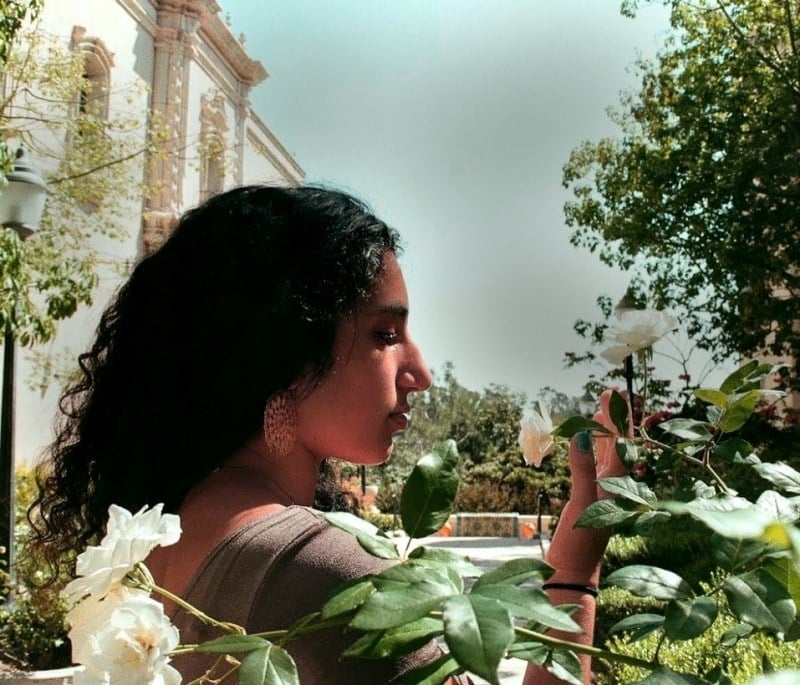Maya Salameh ’22 was named the youngest-ever winner of the Etel Adnan poetry prize last week. The prize, named for Lebanese-American poet, essayist, novelist and visual artist Etel Adnan, celebrates poets of Arab heritage. The University of Arkansas Press will publish Salameh’s manuscript, “How to Make an Algorithm in the Microwave,” alongside previous award winners, in their Etel Adnan Poetry Series.
Salameh, from San Diego, is Lebanese American and Syrian American. Ever since she started writing, Salameh has found inspiration from the history inherent in the body and experience of the Arab American. She wrote her first poem in high school on the plane ride home from a trip with her father to Lebanon, his native country.
“I like to think that I write first and foremost for [Arab] girls like myself, who are taught to be quiet and marriageable as they watch their countries collapse and be taken away from them,” Salameh said.
Historically, poetry has served a unique role in Arab culture. Since before Arabs belonged to nations, poets have documented and expressed Arab history through spoken performance and literature. Salameh has taken on this role of historian in her own family, informed by the long tradition of zajal (oral poetry performed in colloquial dialect).
“We don’t really have access to most of our family records,” Salameh said. “There are many words that have either been forgotten or stripped from me and from our family memory. I think one of my biggest ambitions is to keep as much of it as I can.”
Salameh considers Etel Adnan, the award’s namesake, to be a part of her “artistic ancestry” as a poet. She admired how Adnan could depict war truthfully without compromising the beauty of her words or the dignity of their subjects. Salameh sees her work as a means to furnish a less Orientalist Arab narrative.
“The Merriam Webster says, kind of accusingly, ‘a poem will not stop a draft.’ It can’t serve as a cutting board, or as clothing or as warmth,” Salameh said. “But I think there’s a way that poems serve as witnesses, as simple renderings, especially for populations like Arab Americans who have been rendered as subjects of war.”
Her work is almost radical in its depiction of Arabs as more than broken bodies on the evening news. The Western image of the Arab American body, particularly the Arab American woman’s body, is that of the martyr — in our interview, Salameh gave the example of American charities appropriating images of victimized children to collect donations. In an act of protest, Salameh wishes to depict “bodies at rest” to address the trauma of bearing witness to so much violence on Arab bodies.
At Stanford, Salameh has found many opportunities to hone her craft. As a creative writing minor, she has taken a course of independent study under then-Jones lecturer Charif Shanahan, and this past winter completed a Levinthal tutorial with Sudanese American Stegner Fellow Safia Elhillo, whose work Salameh had long admired. Outside of class, Salameh is the inaugural artist-in-residence at the Markaz and co-chairs the Institute for Diversity in the Arts. She has also found a “creative family” with other poets in Stanford’s Spoken Word Collective, which holds regular spoken-word performances.
Her time at Stanford has also supplied Salameh with her latest artistic preoccupation: technology. Salameh recognizes its complicated relationship with the Arab world. The same devices which surveil Arabs and broadcast their trauma — rendering them as little more than victims or militants — can also be a tool for empowerment. The majority of protests during the Arab Spring were planned using social media, which was also a major force in spreading awareness of the uprisings to the rest of the world. And among displaced populations, those networks can connect refugees and immigrants to their families across vast distances.
She is bothered by how the technology we use watches us, through invisible data collection and our participation in media. It poses a unique threat to Salameh, as Arab Americans are disproportionately subject to government surveillance — think police investigating mosques or innocent Arabs ending up on no-fly lists. In writing about surveillance technology, Salameh turns this invasive dynamic on its head.
“By being nosy back to devices that know so much about us already — when you mirror their curiosity — I think that that does something,” Salameh said. “It feels that, at the very least, you’re returning the gaze.”
Our view from the West might not be as clear as we want to believe. Salameh’s work unbalances American assumptions about subjects of war, but most importantly offers those subjects breathing space — not as martyrs or symbols — but as full-blown, complicated subjects worthy of rest and tenderness.
This article has been corrected to reflect that Etel Adnan is Lebanese American, not Syrian American. The Daily regrets this error.
